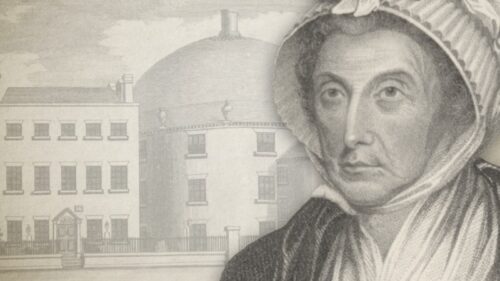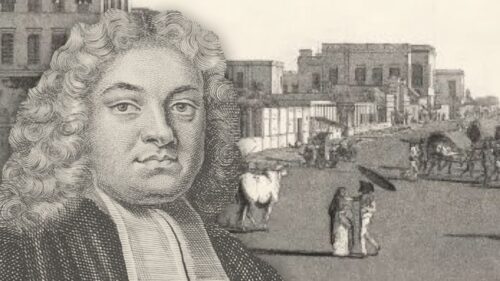-
Maurice Roberts And The Free Offer Hoax
The so-called Banner of Truth’s witch-hunt against alleged Hyper-Calvinists continues with Maurice Roberts quite deceptive apology for their new, radical theology hidden behind the mask of ‘The Free Offer of the Gospel’ (Issue 503-4). Pastor Roberts has picked out all the raisins and nuts he could find in the new BOT cake, seeking to lure traditional BOT readers away from the old paths by these tempting morsels. He has, however, offered us nothing of the seasoning of gall and bitter herbs which makes his cake the most stomach-turning culinary event since the counter-reformation opened their evil-smelling kitchen as purveyors of false food. A little of this comes through in Roberts’ accusing all those who disagree with him of being Hyper-Calvinists, but such tasteless taunts are…
-
John Gill and His Successors
The witness and teaching of Dr John Gill (1697-1771) so impressed his friends Augustus Toplady and James Hervey that they maintained his work would still be of great importance to future generations. This also became the conviction of John Rippon (1750-1836) and Charles Haddon Spurgeon (1834-1892), Gill’s more well-known successors to his pastorate, but it was also the testimony of those who served for shorter periods at Carter Lane such as John Martin, Benjamin Francis and John Fawcett. The witness of these faithful men of God has helped point generations to Gill’s works which have subsequently enriched their lives. The present evangelical establishment is apparently striving to unite Calvinism with Arminianism, Baxterism and worse in an effort to promotean ecumenical doctrinal mish-mash which will suit…
-
19 Bible Doctrine – How Does Paul’s Analogy Of A Potter And The Clay Fit Within The Context Of Romans 9 As A Whole?
A Transcript Of The Video Study In our previous study, we considered the Father’s role in the work of salvation, explained by Paul in Romans 8:28-11:36. You will remember, there are six parts to this section of the letter: In (8:28-39), Paul extols the Father’s eternal blueprint of electing love; in (9:1-5), he confesses his burden for the salvation of the Jews; in (9:6-33), he explains the Father’s eternal blueprint of electing love; in (10:1-3), he once again confesses his burden for the salvation of the Jews; in (10:4-11:32), he once more explains the Father’s eternal blueprint of electing love; and in (11:33-36), he ends where he began, extolling the Father’s eternal blueprint of electing love. Now, the analogy of a potter and the clay…
-
John Gill and the Cause of God and Truth
So often when speaking about the work of the Holy Spirit which infused the churches with new life in the 18th century, mention is made of Anglican stalwarts such as Whitefield, Hervey, Toplady and Romaine. The works of these men through God’s sovereign grace cannot be praised enough but the fact that recent biographers have highlighted their activities has tended to give the impression that other denominations, such as the Baptists, were quite inactive during this period. This is by no means the case as the testimony of John Gill shows. John Gill was born in 1697 in the town of Kettering and became a member of the Particular Baptist church there before being called to the pastorate at Goat Yard Chapel, Horselydown, London. This…
-
18 Bible Doctrine – How Does Paul’s Teaching In Romans 9 Align With God The Father’s Role In Salvation?
A Transcript Of The Video Study In our previous study, I unfolded for you the structure of Paul’s letter to the Romans. It was my purpose to show you how Paul’s teaching in Romans 9 fits into the letter as a whole. Well, I pointed out that there are four main sections to the letter. It opens with an introduction (1:1-17) and closes with a conclusion (15:14-16:27). In between are the two main sections—First, Paul explains why sinners are under condemnation (1:18-3:18); Second, he explains how sinners are secured salvation (3:19-15:13). Now, with reference to God securing salvation for sinners, there are a further four sections to the letter—the role of God the Son in the work of salvation (3:19-5:21); this is connected with the…
-
Reformation Today and Justification from Eternity
The March/April, 1999 number of Reformation Today features four articles on John Gill. The first, entitled John Gill – a Sketch of his Life, is a succinctly written biography of Gill’s faithful and productive life in the service of the gospel. Next, Editor Errol Hulse continues with John Gill – An Appreciation, presented as a review of The Life and Thought of John Gill (1697-1771), (ed. Michael Haykin). Here, Hulse ignores the facts of Gill’s own testimony to make what he calls ‘a fair assessment of the damage which emanated from his errors.’ Thus, though the book Hulse reviews chiefly depicts Gill as a great evangelist and soul-winner, Hulse’s one-sided critique is centred on Gill’s supposed Hyper-Calvinism and lack of evangelistic fervour. This is stretching…





